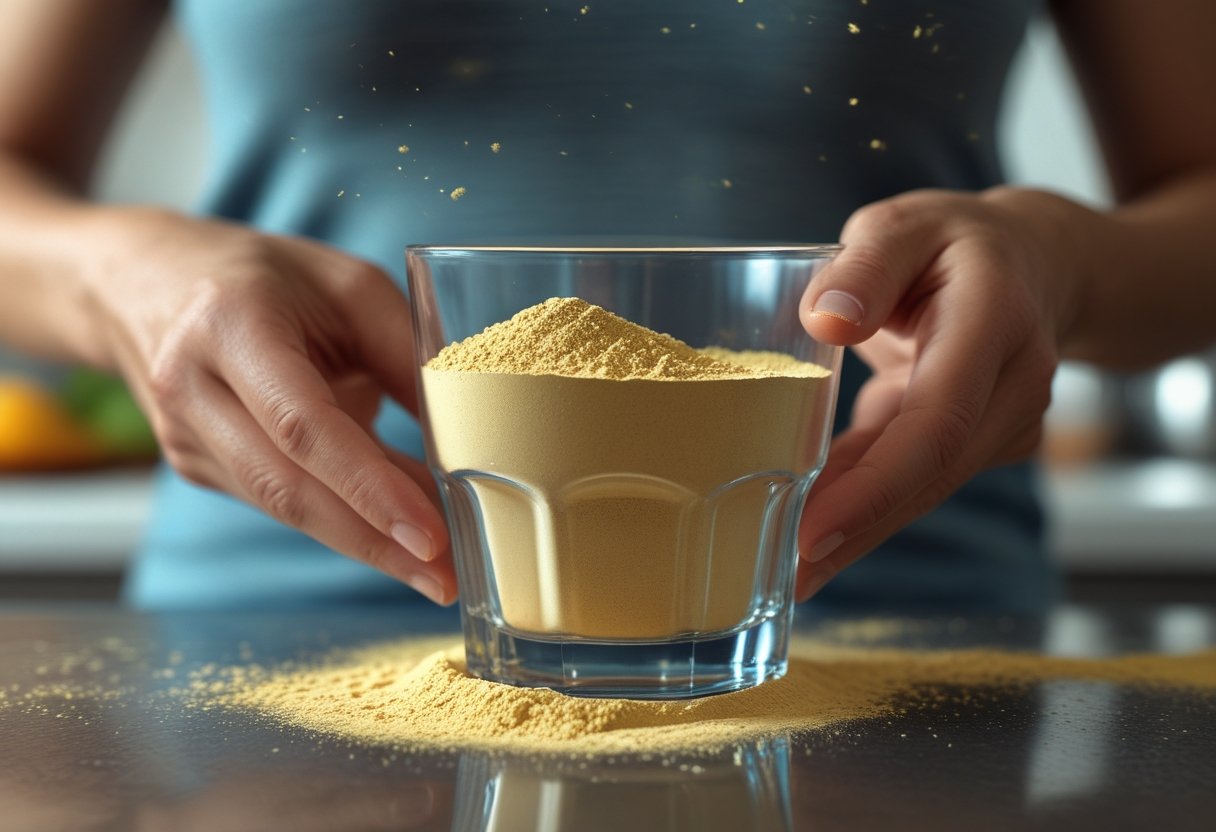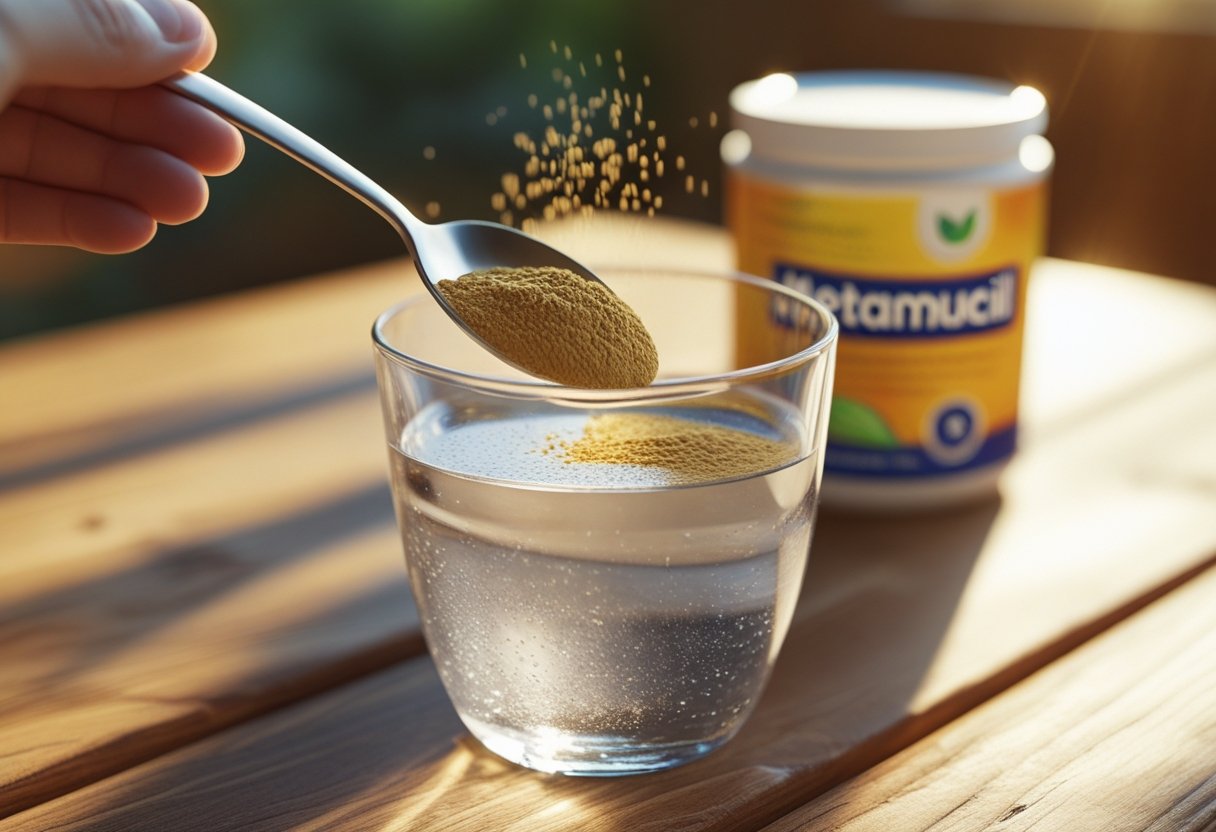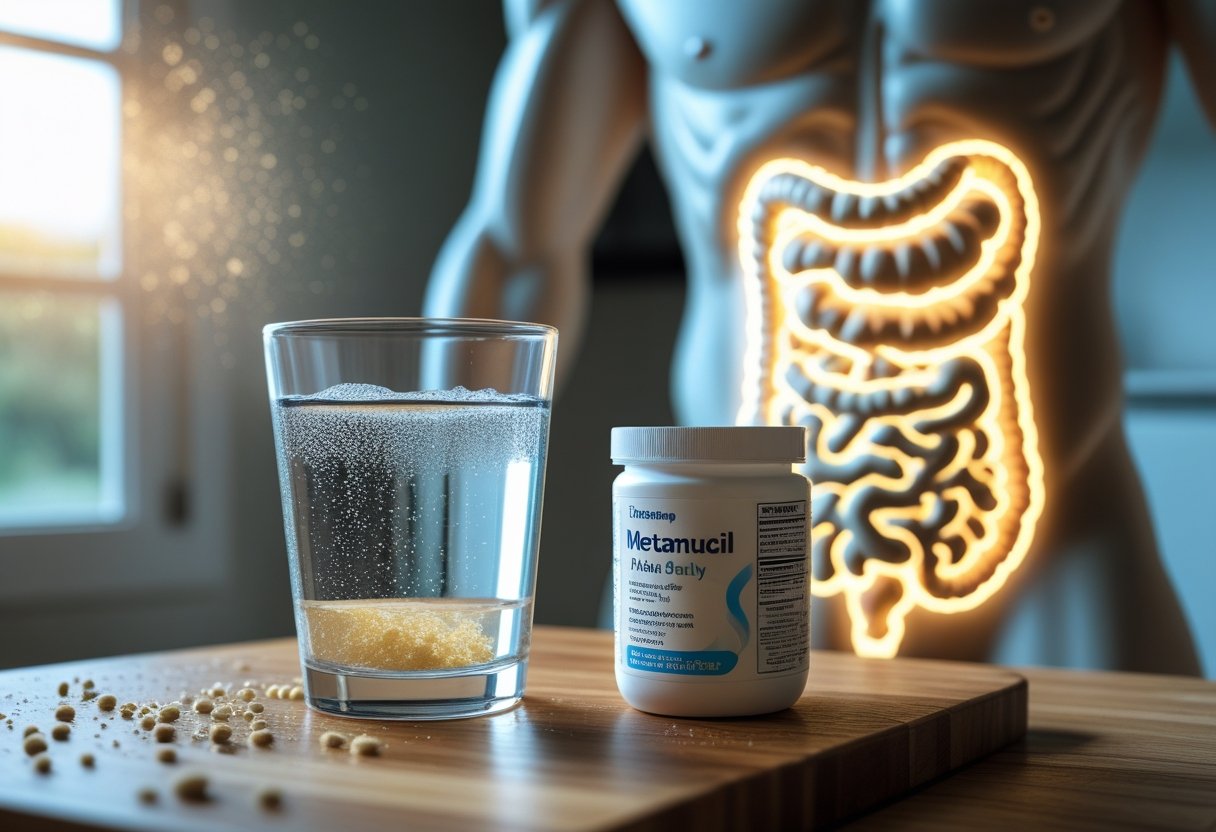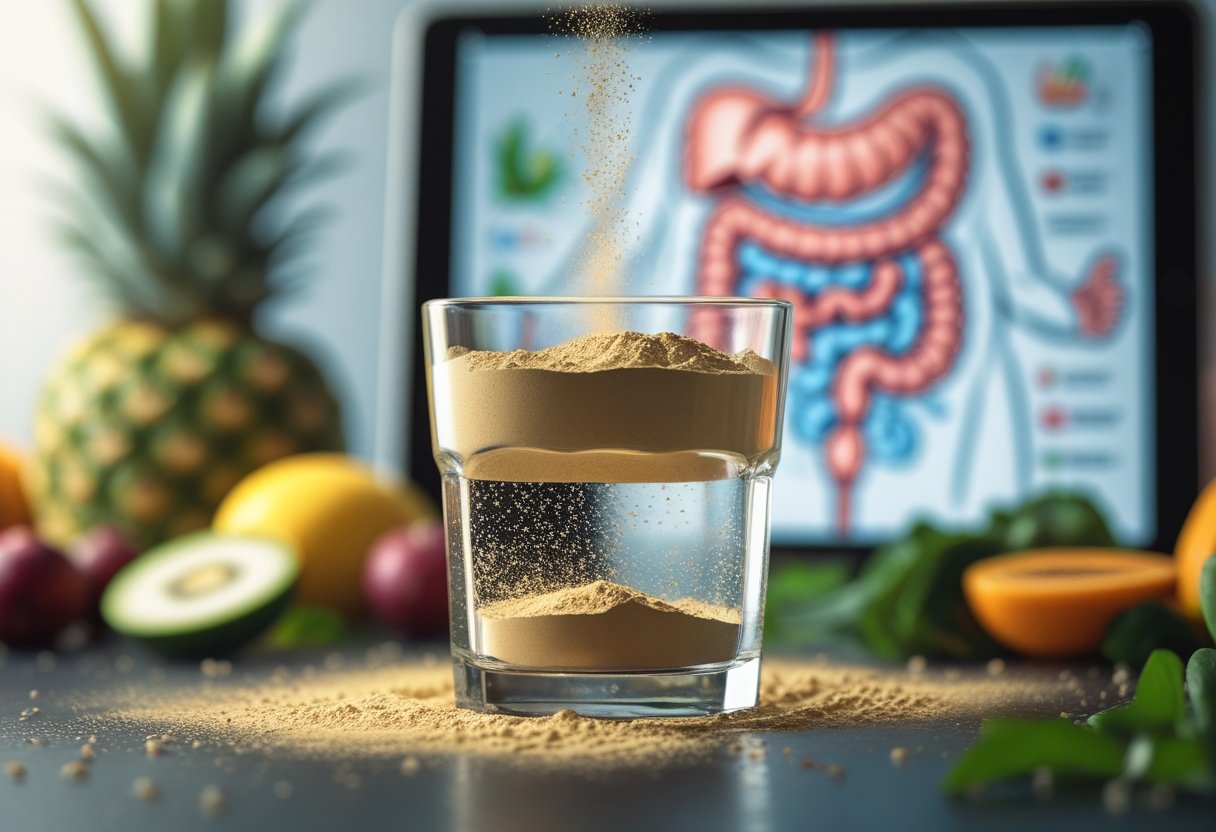Taking Metamucil daily can bring significant changes to your body beyond just improving bowel movements. Many people start using this fiber supplement for digestive issues, but they often discover unexpected benefits like better heart health and blood sugar control.

Daily Metamucil use helps your body trap and remove waste while supporting cholesterol reduction, blood sugar management, and gut health through its psyllium fiber content. The supplement works by forming a gel-like substance in your digestive system that can affect multiple body functions.
However, taking Metamucil every day may come with potential side effects[1] that people should understand before starting a daily routine. Understanding what happens in your body can help you make better decisions about whether daily fiber supplementation fits your health goals.
Key Takeaways
- Metamucil forms a gel in your digestive system that helps with waste removal, cholesterol reduction, and blood sugar control
- Daily use is generally safe but can cause bloating, gas, and may interfere with medication absorption
- Proper hydration and timing are essential for getting benefits while avoiding digestive discomfort
What Is Metamucil and How Does It Work?

Metamucil is a fiber supplement made from natural psyllium husk that forms a gel when mixed with water. This gel-like substance helps regulate digestion, lower cholesterol, and maintain healthy blood sugar levels.
Ingredients and Forms of Metamucil
Metamucil contains 100% natural psyllium husk[2] as its main active ingredient. Psyllium husk comes from the seeds of the Plantago ovata plant.
The supplement is available in several forms:
- Powder: Mixed with water or other liquids
- Capsules: Swallowed with plenty of water
- Fiber wafers: Chewable tablets
The powder form comes in different flavors like orange, berry, and unflavored options. Each serving typically provides 3-6 grams of soluble fiber.
Metamucil also contains inactive ingredients like citric acid, natural flavors, and artificial colors depending on the specific product variety.
How Psyllium Husk Acts in the Body
Psyllium husk works by absorbing water in the intestines[3], making stools bulkier and easier to pass. This process happens because psyllium is a bulk-forming laxative.
When psyllium enters the digestive system, it absorbs up to 10 times its weight in water. This creates a gel-like substance that moves through the intestines.
Unlike clear-mixing fiber supplements, psyllium forms a viscous gel[4] that acts as a daily cleanser. The gel helps the body’s natural toxin removal process.
The psyllium gel also slows down digestion, which helps maintain steady blood sugar levels after meals. This same mechanism helps lower cholesterol by binding to cholesterol particles.
Role as a Fiber Supplement
Metamucil serves as both a soluble and insoluble fiber source for people who don’t get enough fiber from food. Taking fiber supplements every day appears to be safe[5] for most people.
The supplement helps with digestive regularity by softening stools and stimulating bowel movements. Many doctors recommend it for constipation relief.
Metamucil also supports heart health by helping to lower cholesterol levels when taken with a proper diet. The soluble fiber binds to cholesterol in the digestive tract.
People should take medications or vitamins at least two hours before or after Metamucil. The fiber can affect absorption of other medications[6] by trapping them in the intestinal fiber mass.
Immediate Digestive Effects of Daily Metamucil

Metamucil starts working on your digestive system within hours of taking it, with bowel movements typically occurring within 12 to 72 hours[7]. The psyllium fiber creates immediate changes in stool consistency and helps establish regular patterns for those with digestive issues.
Support for Bowel Movements
Metamucil works by absorbing water in the intestines to form a gel-like substance. This process helps soften hard stools and adds bulk to loose stools.
The psyllium fiber can absorb up to 10 times its weight in water. This creates a softer, more formed stool that moves more easily through the colon.
People with irregular bowel movements often see changes within the first few days. The fiber helps create more predictable patterns for elimination.
Key benefits for bowel movements:
- Softer stool consistency
- Increased stool bulk
- Easier passage through intestines
- More comfortable elimination
The gel formation also helps protect the intestinal lining. This can reduce strain during bowel movements.
How Metamucil Relieves Constipation
Metamucil treats constipation[7] by adding moisture and bulk to stool. The psyllium fiber draws water into the intestines from surrounding tissues.
This added moisture prevents stool from becoming too hard and dry. Hard stool is one of the main causes of constipation and difficult bowel movements.
The bulking action also stimulates the intestinal muscles. These muscles contract more effectively when there is adequate stool volume present.
People with chronic constipation may need several days to see full effects. The body needs time to adjust to the increased fiber intake.
Timeline for constipation relief:
- Day 1-2: Initial water absorption begins
- Day 3-5: Stool consistency improves
- Week 1: Regular patterns may develop
Some people experience mild bloating initially. This usually decreases as the digestive system adapts to the fiber.
Impact on Bowel Regularity
Daily Metamucil use helps establish consistent bowel movement patterns. The psyllium fiber helps maintain regularity[8] by providing steady bulk and moisture.
Most people develop more predictable timing for bowel movements. This happens because the fiber creates consistent stool formation throughout the week.
The regularity benefits work best when taken at the same time each day. This creates a steady supply of fiber moving through the digestive system.
Factors that improve regularity:
- Taking Metamucil at consistent times
- Drinking adequate water throughout the day
- Maintaining regular meal schedules
- Getting enough physical activity
People switching from irregular patterns may notice the biggest changes. Those who already have regular bowel movements may see improvements in stool quality and ease of passage.
The digestive health benefits[8] become more noticeable after several weeks of consistent use. The intestines adapt to the steady fiber supply and function more efficiently.
Changes in Cholesterol Levels and Heart Health

The psyllium fiber in Metamucil forms a gel-like substance that traps cholesterol in the digestive system, forcing the liver to pull LDL cholesterol from the bloodstream. This process can lead to measurable reductions in bad cholesterol levels and support overall cardiovascular wellness.
Role of Soluble Fiber in Lowering Cholesterol
The psyllium fiber in Metamucil helps lower cholesterol[9] through a specific biological process. When psyllium enters the digestive system, it forms a thick, gel-like substance that moves through the intestines.
This gel traps bile acids that contain cholesterol. Normally, bile acids get recycled back to the liver after helping digest food.
The trapped bile cannot return to circulation. The liver must compensate by creating new bile acids. To make these new bile acids, the liver pulls LDL cholesterol from the bloodstream.
Research shows that soluble fiber helps lower LDL cholesterol levels by binding with cholesterol[10] and removing it from the body. This mechanism directly reduces the amount of bad cholesterol circulating in blood vessels.
The FDA recognized this benefit in 1998. Foods containing psyllium can claim that 7 grams of soluble fiber daily may reduce heart disease risk by lowering cholesterol levels.
Potential Impact on Heart Health
Lower LDL cholesterol levels reduce the risk of plaque buildup in arteries. When cholesterol accumulates in arterial walls, it increases the chance of heart attacks and strokes.
Studies demonstrate that psyllium can lower both total and LDL cholesterol levels[11], which may help reduce cardiovascular disease risk. The reduction in bad cholesterol supports better blood flow through arteries.
Daily psyllium intake creates consistent cholesterol management. Unlike one-time interventions, regular fiber supplementation maintains steady bile acid elimination. This ongoing process keeps cholesterol levels more stable.
The cardiovascular benefits extend beyond just cholesterol reduction. Improved digestive health from increased fiber intake supports the body’s natural detoxification processes.
People with existing heart conditions may see additional benefits. However, those taking heart medications should consult healthcare providers before starting daily Metamucil supplementation.
Blood Sugar Management and Implications for Diabetes

Metamucil’s psyllium fiber creates significant changes in how the body processes sugar and manages blood glucose. Studies show that psyllium can decrease blood sugar spikes by up to 30%[12] after meals.
Slower Absorption of Glucose
The soluble fiber in Metamucil forms a gel-like substance in the digestive tract. This gel slows down how quickly sugar enters the bloodstream after eating.
Metamucil’s bulking effect increases feelings of fullness and slows glucose absorption[7]. The fiber acts like a barrier that sugar must pass through before reaching the blood.
When someone takes Metamucil before meals, it creates this protective effect. The psyllium fiber mixes with food and water in the stomach. This mixture takes longer to break down and digest.
Key effects on glucose absorption:
- Reduces speed of sugar entering bloodstream
- Creates more stable blood sugar levels throughout the day
- Prevents sharp rises in glucose after eating
- Helps maintain steady energy levels
This slower absorption means blood sugar levels rise more gradually. The body has more time to produce insulin and process the glucose properly.
Benefits for Type 2 Diabetes
People with type 2 diabetes see meaningful improvements when taking psyllium regularly. Research shows psyllium consumption significantly decreases fasting blood glucose levels[13].
Multiple studies in patients with type 2 diabetes showed significant improvement in fasting blood glucose when psyllium was taken before meals[14]. The improvements appear after several weeks of consistent use.
Specific diabetes benefits include:
- Lower fasting blood sugar readings
- Reduced HbA1c levels over time
- Better overall blood sugar control
- Improved insulin sensitivity
Taking psyllium husk before meals can lower fasting blood sugar in people with diabetes[15]. This effect works best when combined with a healthy diet.
The addition of psyllium to a traditional diabetes diet is safe, well tolerated, and improves blood sugar control[16]. Many doctors recommend it as part of diabetes management plans.
The fiber helps stabilize blood sugar throughout the day. This reduces the need for frequent blood sugar monitoring and may help with medication management.
Metamucil as a Prebiotic and Gut Microbiome Support

Metamucil’s psyllium husk fiber acts as a prebiotic that feeds beneficial gut bacteria and creates favorable conditions for microbiome balance. The soluble fiber provides nourishment for beneficial gut bacteria[17], promoting digestive health through enhanced bacterial diversity.
Prebiotic Effects on Gut Bacteria
The psyllium husk in Metamucil functions as a prebiotic by providing food for beneficial bacteria in the digestive system. Research shows that psyllium supplementation increases specific beneficial bacteria including Lachnospira, Faecalibacterium, and Veillonella[18].
These bacteria ferment the psyllium fiber into short-chain fatty acids. The most important of these include acetate, propionate, and butyrate.
Key bacterial changes with daily Metamucil use:
- Increased butyrate-producing bacteria
- Enhanced Bifidobacteria growth
- Greater microbial diversity
The prebiotic effect is more pronounced in people with digestive issues. Studies found larger changes in microbial composition among constipated patients compared to healthy individuals[18].
Promoting Digestive Balance
Daily Metamucil intake helps maintain a balanced gut microbiome by creating optimal conditions for beneficial bacteria to thrive. The prebiotic fiber blend supports digestive health[19] by encouraging the growth of protective bacterial strains.
The fiber increases water content in the colon. This creates an environment that favors helpful bacteria while discouraging harmful microorganisms.
Benefits of improved microbiome balance:
- Better nutrient absorption
- Enhanced immune function
- Reduced digestive inflammation
- More regular bowel movements
Metamucil and probiotics can complement each other[20] when taken together. The fiber provides food for both naturally occurring bacteria and supplemented probiotic strains.
The prebiotic effects develop gradually with consistent daily use. Most people notice improved digestive balance within two to four weeks of regular supplementation.
Bloating, Gas, and Other Digestive Side Effects

Metamucil can cause gas and bloating[21], especially during the first few days of use. Most digestive discomforts decrease as the body adjusts to increased fiber intake.
Common Initial Discomforts
New users often experience digestive upset when starting Metamucil. The most common complaints include bloating, intestinal gas, and stomach cramps.
Fiber supplements can lead to uncomfortable side effects[22] when people increase their intake too quickly. The digestive system needs time to adapt to higher fiber levels.
Typical early side effects include:
- Excessive gas production
- Abdominal bloating
- Mild stomach cramping
- Feeling of fullness
These symptoms typically appear within the first 2-3 days of use. They usually fade after one week as gut bacteria adjust to processing more fiber.
People who take large doses right away face more severe discomfort. Starting with smaller amounts reduces the intensity of initial side effects.
Managing Bloating and Gas
Several strategies help minimize digestive discomfort when taking Metamucil daily. The most effective approach involves starting slowly and making gradual increases.
Dosage recommendations:
| Week | Amount | Times Daily |
|---|---|---|
| 1 | 1/2 dose | Once |
| 2 | 1/2 dose | Twice |
| 3+ | Full dose | As directed |
Drinking plenty of water prevents the fiber from forming thick gel in the digestive tract. Each dose requires at least 8 ounces of liquid.
Taking Metamucil with meals spreads fiber throughout the day. This approach causes less digestive stress than consuming large amounts at once.
Gas and bloating from fiber[23] usually improve with consistent use. The digestive system becomes more efficient at processing psyllium over time.
People should avoid carbonated drinks when taking fiber supplements. The combination increases gas production and bloating.
Recognizing Potential Allergic Reactions
Some individuals develop allergic responses to psyllium, the active ingredient in Metamucil. These reactions require immediate medical attention.
Serious allergic symptoms include:
- Skin rash or hives
- Difficulty breathing
- Swelling of face, lips, or throat
- Chest tightness
Signs of allergic reactions[24] can appear as redness, blistering, or peeling skin. Wheezing and trouble swallowing also indicate serious problems.
Healthcare workers who handle psyllium powder face higher allergy risks. Fine dust particles become airborne and cause sensitization through inhalation.
People with known plant allergies should consult doctors before starting Metamucil. Those with asthma or breathing problems need extra caution.
When to seek medical help:
- Breathing difficulties develop
- Severe skin reactions appear
- Swallowing becomes difficult
- Symptoms worsen instead of improving
Anyone experiencing these warning signs should stop taking Metamucil immediately and contact their healthcare provider.
Best Practices for Daily Fiber Supplementation

Taking Metamucil correctly requires proper dosage timing and adequate fluid intake. Following specific mixing instructions and staying well-hydrated prevents side effects and maximizes benefits.
Proper Dosage and Timing
Start with a small amount of Metamucil to let your body adjust to increased fiber intake. Begin with one teaspoon or one capsule daily for the first week.
Gradually increase to the recommended dose over 7-10 days. Most adults can take one to three servings daily based on their dietary fiber needs.
Best timing options:
- Morning: Helps establish regular bowel movements
- Before meals: May help with appetite control
- Same time daily: Consistency helps maintain regular bathroom habits[25]
Take Metamucil at least 2 hours before or after medications. Fiber supplements can affect how the body absorbs certain drugs.
Mixing Instructions and Fluid Intake
Mix one rounded teaspoon of Metamucil powder in 8 ounces of cool liquid. Stir briskly and drink immediately before the mixture thickens.
Proper hydration is critical when taking any fiber supplement. Drink at least 8 ounces of water with each dose plus additional fluids throughout the day.
Mixing tips:
- Use cold water, juice, or other beverages
- Stir quickly to prevent clumping
- Drink right away
- Follow with another glass of water
Insufficient fluids can cause the fiber to form a thick gel in the digestive tract, leading to blockages or discomfort.
Hydration and Its Role in Fiber Supplement Use

Water intake becomes critical when taking Metamucil because the psyllium husk needs fluids to work properly in your digestive system. Dehydration while taking Metamucil can lead to severe constipation[26] and uncomfortable bloating.
Why Fluids Are Essential
Metamucil contains psyllium husk that absorbs water in the intestines to form a gel-like substance. This gel helps move waste through the digestive system smoothly.
Without enough water, the fiber cannot form this gel properly. The psyllium husk may actually absorb water from the intestines instead of adding moisture.
This creates a thick, dry mass that becomes difficult to pass. The result is often worse constipation than before taking the supplement.
Daily Water Requirements:
- 6-8 glasses of water per day minimum
- Extra 8 ounces with each Metamucil dose
- More fluids needed in hot weather or during exercise
Proper hydration is vital for the insufficient formation of the fiber gel[26]. People should drink water immediately when taking Metamucil and continue drinking fluids throughout the day.
Signs of Dehydration to Watch For
Several warning signs indicate insufficient fluid intake while using Metamucil. These symptoms often appear within 24-48 hours of starting the supplement.
Physical Symptoms:
- Hard, dry stools that are difficult to pass
- Stomach cramps or sharp abdominal pain
- Excessive gas and bloating
- Nausea or feeling sick to the stomach
Behavioral Changes:
- Straining during bowel movements
- Going longer than usual without a bowel movement
- Feeling like bowel movements are incomplete
Dark yellow urine also signals dehydration. Normal urine should be light yellow or clear when drinking enough fluids.
People experiencing these symptoms should increase their water intake immediately. They should also contact a doctor if symptoms persist after drinking more fluids for 24 hours.
Who Should and Should Not Use Metamucil Daily

While Metamucil is generally safe for most adults, certain health conditions require special consideration before starting daily use. People with irritable bowel syndrome need careful evaluation, and those with chronic health conditions should consult healthcare providers first.
Considerations for People with IBS
People with irritable bowel syndrome face unique challenges when considering daily Metamucil use. The psyllium fiber in Metamucil can help some IBS patients manage symptoms, but it may worsen conditions for others.
IBS-C patients (those with constipation-predominant IBS) often benefit from daily Metamucil use. The soluble fiber helps regulate bowel movements and reduces abdominal discomfort.
IBS-D patients (those with diarrhea-predominant IBS) should approach Metamucil with caution. The fiber can sometimes increase gas and bloating, making symptoms worse.
Key considerations for IBS patients:
- Start with very small doses
- Monitor symptoms closely for the first two weeks
- Drink extra water to prevent gas buildup
- Stop use if cramping or bloating increases
People with IBS should work with their doctor to determine if daily Metamucil fits their treatment plan. Individual responses vary greatly among IBS patients.
Precautions for Chronic Health Conditions
Several chronic health conditions require special precautions before starting daily Metamucil use. People with certain medical conditions should avoid Metamucil[27] or use it only under medical supervision.
Diabetes patients need blood sugar monitoring when starting Metamucil. The fiber can affect how medications are absorbed and may change insulin requirements.
Heart patients taking medications should be cautious. Metamucil can interfere with some heart medications if taken too close together.
People with swallowing difficulties should avoid Metamucil powder forms. The thick consistency can create choking hazards or blockages.
Conditions requiring medical approval:
- Kidney disease – affects fluid balance
- Bowel obstructions – fiber can worsen blockages
- Chronic constipation with unknown causes
- Recent abdominal surgery – healing tissues need time
Children under six years should not take Metamucil[6] unless a doctor specifically recommends it. Their digestive systems handle fiber differently than adults.
Selecting the Right Metamucil Product for You
Metamucil comes in two main forms that deliver the same psyllium husk fiber benefits. The choice between powder and capsules depends on convenience, cost, and personal preferences for taste and texture.
Comparing Powder vs Capsules
Metamucil capsules and powder both support healthy digestion[28] and provide identical fiber benefits. The powder form typically costs less per serving and allows for easier dose adjustment.
Powder advantages:
- Lower cost per dose
- Faster dissolution and absorption
- Customizable serving sizes
- Available in multiple flavors
Capsule advantages:
- No mixing required
- Portable and convenient
- No taste or texture issues
- Consistent dosing
The powder requires mixing with 8 ounces of water and must be consumed immediately. Capsules need to be taken with plenty of water but offer more convenience for busy lifestyles.
People who travel frequently or have unpredictable schedules often prefer capsules. Those who take Metamucil at home and want better value typically choose powder.
Choosing Based on Lifestyle and Preferences
Your daily routine and personal preferences should guide your choice. Morning commuters and office workers benefit from capsules they can take anywhere with a water bottle.
Choose capsules if you:
- Travel frequently for work
- Dislike mixing drinks
- Have a sensitive gag reflex
- Need portion control
Choose powder if you:
- Want the most economical option
- Prefer adjusting your fiber intake
- Don’t mind the preparation time
- Like flavored options
New users should start with one serving per day[8] regardless of the form chosen. Both powder and capsules require adequate water intake throughout the day to prevent digestive discomfort.
The fiber supplement works the same way in both forms. Your body processes the psyllium husk identically whether it comes from powder or capsules.
Safety, Long-term Effects, and When to Seek Medical Advice
Daily Metamucil use appears safe for most people when taken correctly, though some individuals may experience side effects or need medical guidance. Bulk-forming laxatives are safe for long-term use[29] and well-tolerated by most users.
Potential Long-term Benefits and Risks
Long-term Benefits:
- Improved digestive health and regular bowel movements
- Lower cholesterol levels when combined with proper diet
- Better blood sugar control in some individuals
- Reduced risk of heart disease
Common Side Effects: Daily users may experience abdominal cramps, bloating, or changes in stool consistency. These effects often decrease as the body adjusts to increased fiber intake.
Serious Risks: People who don’t drink enough water face severe constipation risks. If the daily recommended amount of fluid is not consumed, then Metamucil could cause severe constipation[6], especially in dehydrated individuals.
Allergic Reactions: Some people develop allergic reactions to psyllium. Symptoms include hives, difficulty breathing, or facial swelling requiring immediate medical attention.
Habit Formation: Laxatives can be habit-forming if they are taken too much or for too long[6]. However, fiber supplements like Metamucil pose lower dependency risks than stimulant laxatives.
When to Consult a Healthcare Provider
Immediate Medical Attention Required: Call your doctor immediately if you start bleeding from your rectum, develop severe stomach pain, experience bloating after taking Metamucil[6], or notice any concerning symptoms.
Before Starting Daily Use: People with medical conditions, pregnant women, or those taking medications should consult healthcare providers first. It is important to talk to your doctor before taking Metamucil, especially if you have any medical conditions[30].
Duration Limits: Do not take Metamucil for more than seven days in a row without a doctor’s advice[6]. Long-term daily use requires medical supervision.
Special Populations: Children under six, people with swallowing difficulties, or those with gastrointestinal blockages need medical guidance before use.
Frequently Asked Questions
People often have concerns about daily fiber supplementation and its effects on their bodies. Common questions focus on potential side effects, weight changes, proper usage methods, and timing considerations.
What are the long-term side effects of daily Metamucil intake?
Long-term daily use of Metamucil is generally safe for most people. The body typically adjusts to regular fiber intake within a few weeks of consistent use.
Some individuals may experience ongoing mild bloating or gas if they consume too much too quickly. Starting with smaller doses and gradually increasing helps minimize these effects.
The main concern with extended use involves potential nutrient absorption interference. Taking Metamucil too close to medications or vitamins may reduce their effectiveness.
People with certain medical conditions should consult healthcare providers before beginning long-term use. Those with swallowing difficulties or intestinal blockages need medical guidance.
Can daily Metamucil use lead to weight gain?
Metamucil itself contains minimal calories and does not directly cause weight gain. Each serving typically provides only 10-20 calories depending on the formulation.
The fiber content helps people feel fuller for longer periods. This satiety effect often leads to reduced calorie intake throughout the day.
Some flavored versions contain added sugars that contribute extra calories. Sugar-free options eliminate this concern while providing the same fiber benefits.
Water retention may cause temporary weight fluctuations when starting Metamucil. This effect usually stabilizes after the first week of regular use.
How should I use Metamucil to effectively manage constipation?
Start with one serving daily and gradually increase to find the right amount for regular bowel movements. Most adults need 1-3 servings per day for optimal results.
Mix the powder thoroughly with at least 8 ounces of water or juice. Drinking additional water throughout the day enhances effectiveness and prevents potential blockages.
Take Metamucil at the same time each day to establish a routine. Consistency helps the digestive system adapt and respond predictably.
Taking Metamucil daily helps bridge fiber gaps[31] by adding bulk and softening stool for easier passage.
Is it harmful to take Metamucil before sleep, and if so, why?
Taking Metamucil close to bedtime is not necessarily harmful but may not be ideal. The digestive system works more slowly during sleep periods.
Some people experience increased gas or bloating when lying down after fiber intake. These effects can disrupt sleep quality and comfort.
Morning or afternoon timing allows the fiber to work with natural digestive rhythms. This approach typically produces more predictable and comfortable results.
If bedtime dosing is necessary, allow at least 2-3 hours between taking Metamucil and lying down. This timing helps prevent digestive discomfort during sleep.
What are the common side effects of taking Metamucil every day?
Gas and bloating are the most frequent initial side effects when beginning daily Metamucil use. These symptoms usually decrease as the body adjusts to increased fiber intake.
Stomach cramping may occur if someone takes too much too quickly. Starting with smaller amounts and increasing gradually prevents this issue.
Some people experience changes in bowel movement frequency or consistency during the first week. This adjustment period is normal and typically resolves quickly.
Allergic reactions are rare but possible, especially in people sensitive to psyllium. Symptoms may include skin rash, difficulty breathing, or swelling.
How can I alleviate bloating after taking Metamucil?
Reduce the serving size temporarily and increase it slowly over several days. This gradual approach allows the digestive system to adapt without overwhelming it.
Drink more water throughout the day to help fiber move through the digestive tract. Adequate hydration prevents fiber from becoming stuck and causing discomfort.
Bloating while taking Metamucil[6] can often be managed by adjusting timing and dosage according to individual tolerance.
Light physical activity like walking helps stimulate digestion and reduce gas buildup. Gentle movement encourages proper fiber processing through the intestines.
References
- Metamucil Side Effects: Daily Use, Gas, Bloating & Safety. https://masalamonk.com/side-effects-of-taking-metamucil-every-day-what-you-should-know/ Accessed November 3, 2025
- How Metamucil Works in Your Body. https://www.metamucil.com/en-us/articles/metamucil-benefits/how-does-metamucil-work Accessed November 3, 2025
- Metamucil (Psyllium): Uses, Side Effects & Dosage Guide. https://www.medicoverhospitals.in/medicine/metamucil Accessed November 3, 2025
- How Metamucil works in your body?. https://www.metamucil.com.au/en-au/articles/about-metamucil/how-metamucil-works-in-your-body Accessed November 3, 2025
- Fiber supplements: Safe to take every day?. https://www.mayoclinic.org/healthy-lifestyle/nutrition-and-healthy-eating/expert-answers/fiber-supplements/faq-20058513 Accessed November 3, 2025
- Metamucil Patient Tips: 7 things you should know. https://www.drugs.com/tips/metamucil-patient-tips Accessed November 3, 2025
- Metamucil: Uses, Side Effects, Warnings. https://www.drugs.com/metamucil.html Accessed November 3, 2025
- Dietary Fiber Supplement FAQ. https://www.metamucil.com/en-us/faqs/metamucil-faqs Accessed November 3, 2025
- How Can Psyllium Fiber Help Lower Cholesterol?. https://www.metamucil.com/en-us/articles/psyllium-fiber/how-the-psyllium-fiber-in-metamucil-can-help-lower-cholesterol Accessed November 3, 2025
- How Does Metamucil Lower Cholesterol: What You Need To Know . https://theheartdietitian.com/does-metamucil-lower-cholesterol/ Accessed November 3, 2025
- Does Metamucil Lower LDL Cholesterol?. https://www.pritikin.com/does-metamucil-lower-ldl-cholesterol Accessed November 3, 2025
- Fathom. https://fathomjournal.org/z807v87t-iv5v-g1sugar4pn-38c1-mcsf Accessed November 3, 2025
- ScienceDirect. https://www.sciencedirect.com/science/article/pii/S1756464623002852 Accessed November 3, 2025
- Just a moment.... https://ajcn.nutrition.org/article/S0002-9165(23)27235-4/fulltext Accessed November 3, 2025
- Psyllium Husk: What It Is and Health Benefits. https://health.clevelandclinic.org/psyllium-husk Accessed November 3, 2025
- ScienceDirect. https://www.sciencedirect.com/science/article/pii/S0002916522041284 Accessed November 3, 2025
- Amazon. https://casadesante.com/blogs/probiotics/can-i-take-metamucil-and-probiotics-together Accessed November 3, 2025
- The Effect of Psyllium Husk on Intestinal Microbiota in Constipated Patients and Healthy Controls. https://pmc.ncbi.nlm.nih.gov/articles/PMC6358997/ Accessed November 3, 2025
- Metamucil Gummies. https://www.metamucil.com/en-us/products/gummies/metamucil-gummies Accessed November 3, 2025
- 403 Forbidden. https://trudtox.com/is-it-possible-to-take-probiotics-and-metamucil-together.html Accessed November 3, 2025
- Metamucil: Gas And Bloating Side Effects?. https://medshun.com/article/can-metamucil-cause-gas-and-bloating Accessed November 3, 2025
- 8 Warning Signs You’ve ‘Overdosed’ on Fiber Supplements. https://www.everydayhealth.com/nutrients-supplements/symptoms-of-an-overdose-of-fiber-supplements/ Accessed November 3, 2025
- Belching, gas and bloating: Tips for reducing them. https://www.mayoclinic.org/diseases-conditions/gas-and-gas-pains/in-depth/gas-and-gas-pains/art-20044739 Accessed November 3, 2025
- Metamucil Side Effects: Common, Severe, Long Term. https://www.drugs.com/sfx/metamucil-side-effects.html Accessed November 3, 2025
- Consistency helps maintain regular bathroom habits. https://www.health.com/when-to-take-fiber-8762467 Accessed November 3, 2025
- How Much Water Should I Drink When Taking Metamucil?. https://stellarlifestylecollective.com/how-much-water-should-i-drink-when-taking-metamucil/ Accessed November 3, 2025
- Who Should Not Use Metamucil? A 2025 Safety Guide. https://flavor365.com/when-to-avoid-metamucil-a-complete-user-guide/ Accessed November 3, 2025
- Metamucil capsules and powder both support healthy digestion. https://www.verywellhealth.com/metamucil-capsules-vs-powder-8771079 Accessed November 3, 2025
- Laxatives: Which Types Are Safe For Long-Term Use?. https://medshun.com/article/which-laxative-better-for-ong-term-use Accessed November 3, 2025
- Metamucil Review: Does It Really Work for Constipation and Gut Health? - Should you Buy This? Find Out. https://repositive.io/nutrition/metamucil-review/ Accessed November 3, 2025
- Daily Metamucil: The Surprising Body Changes & Hidden Health Benefits You Never Knew. https://greycicada.com/daily-metamucil-the-surprising-body-changes-hidden-health-benefits-you-never-knew/ Accessed November 3, 2025
